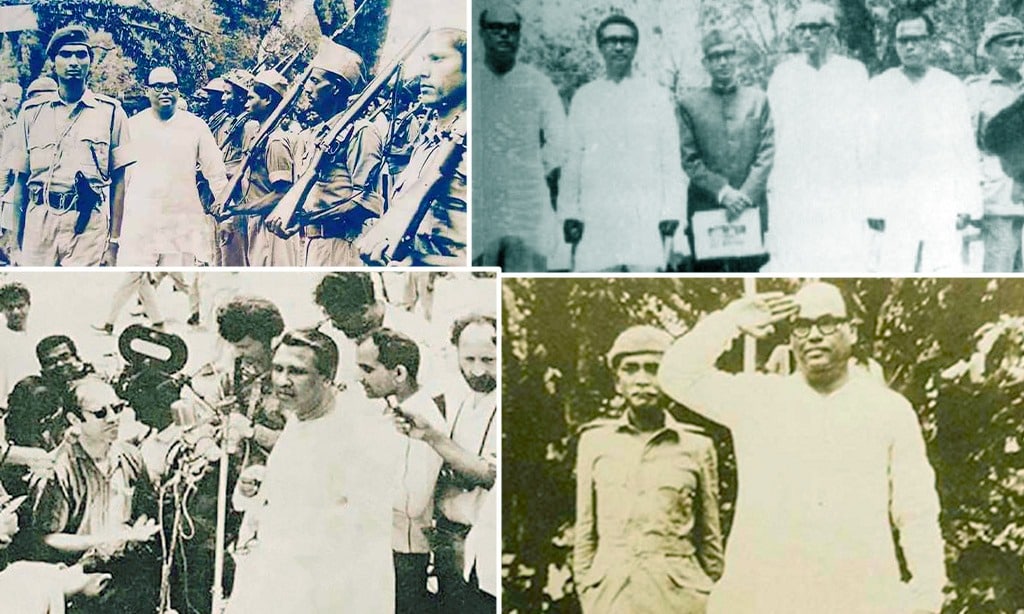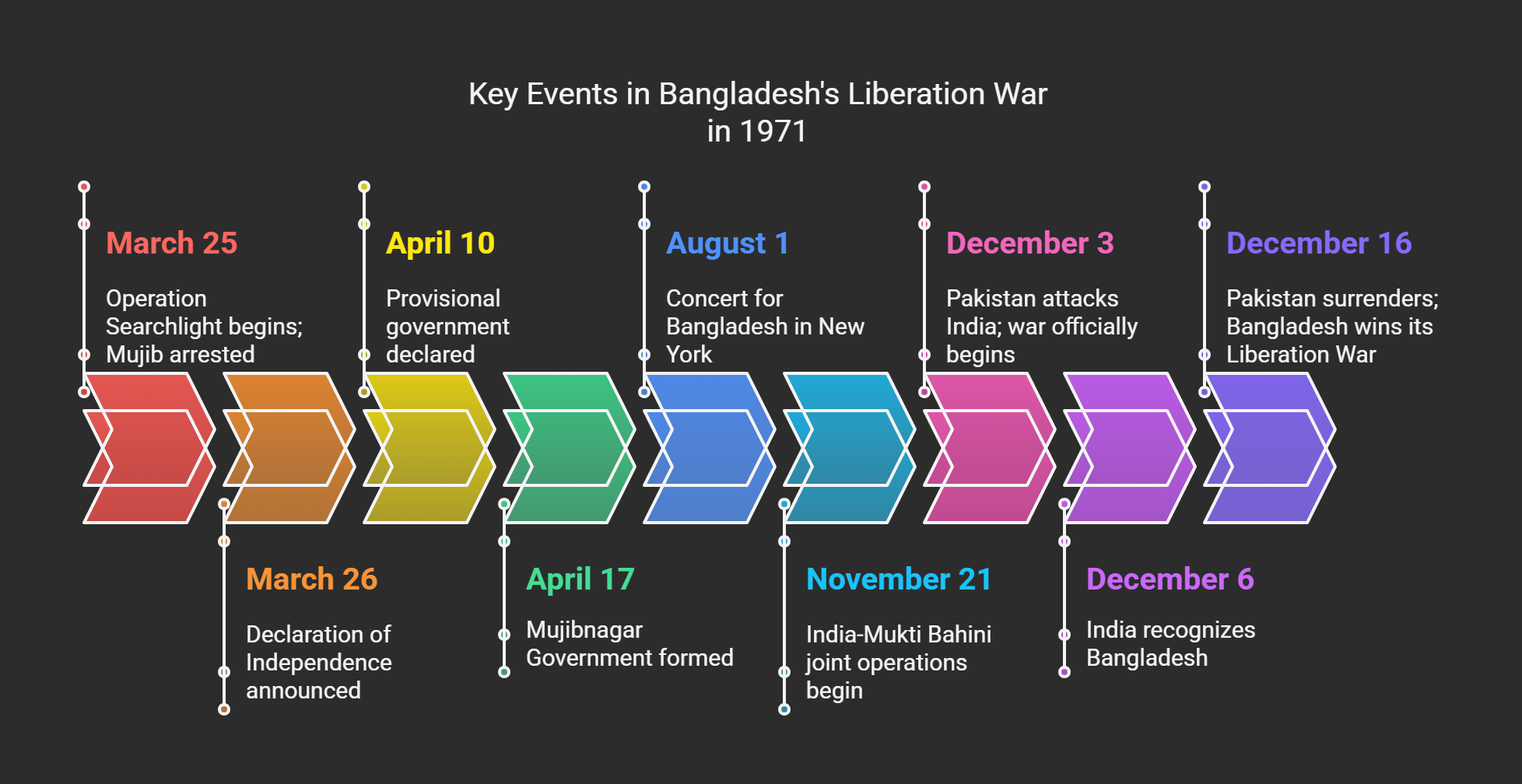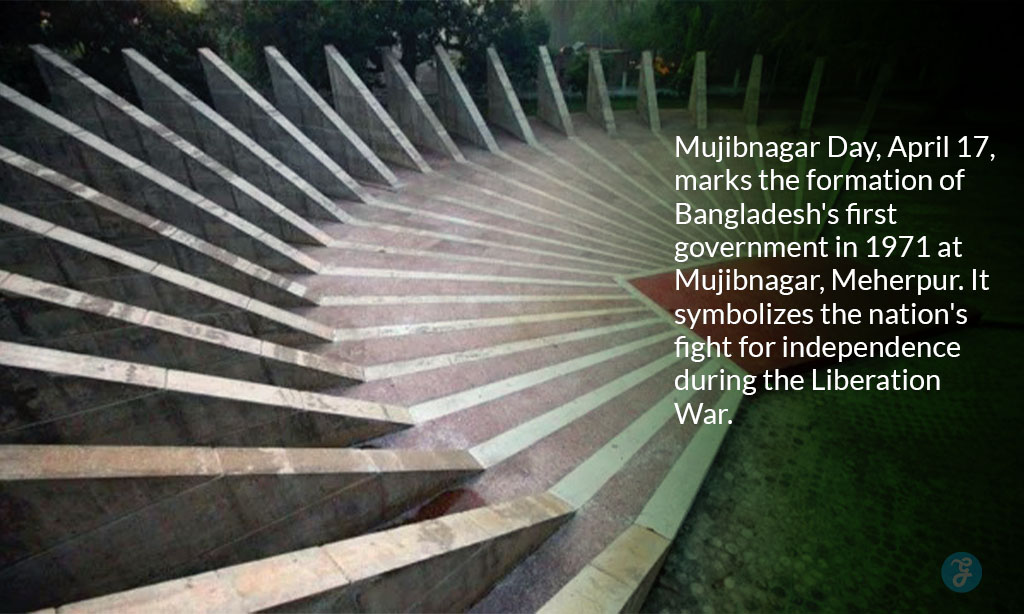In the early months of 1971, the land that would become Bangladesh was in chaos. The Pakistani military had launched a brutal operation against civilians in East Pakistan (now Bangladesh), leading to widespread killings, arrests, and destruction. The hope for freedom was hanging by a thread—but it was far from extinguished.
Amid this darkness, a historic day arrived: April 17, 1971. The day is called the Mujibnagar Day 1971. On this day, a group of brave and visionary leaders came together in a remote village to formally establish the Provisional Government of Bangladesh—a government that would lead the people toward their long-awaited independence.
This day is now known as Mujibnagar Day. It marks the first official step toward the creation of a sovereign Bangladesh, with a structured leadership and a bold declaration to the world that the people of this land would no longer live under oppression.
The Road to April 17: A Nation in Turmoil
To understand the importance of Mujibnagar Day, we must look back at the events that led to it.
On March 25, 1971, the Pakistani army launched Operation Searchlight, a military crackdown on the people of East Pakistan. The operation targeted political leaders, students, intellectuals, and ordinary civilians. Entire neighborhoods in Dhaka were burned. People were killed in the streets and homes.
Just before his arrest that night, Sheikh Mujibur Rahman, the leader of the Awami League, sent a message declaring the independence of Bangladesh. While he was taken to West Pakistan, his message was quickly spread through various channels, including a powerful radio broadcast by Major Ziaur Rahman on March 26, where he declared independence on behalf of Mujib.
In the weeks that followed, members of the Awami League and other supporters of the independence movement fled to India to regroup and organize. They knew that to fight the Pakistani military and gain support from the international community, they needed a formal government. Thus began the plan to form the Provisional Government of Bangladesh.
Mujibnagar Day 1971: Strategic and Symbolic Location
The location of the government’s formation was carefully chosen. The ceremony took place at Baidyanathtala, a quiet area surrounded by mango groves in the Meherpur district, which was part of Kushtia at that time. Later, this place was renamed Mujibnagar, in honor of Sheikh Mujibur Rahman.
This location was chosen for several reasons:
-
It was close to the Indian border, making it easier for leaders to escape if needed.
-
It was safe from immediate military attack.
-
It was symbolic—a hidden spot where the flame of freedom could safely be ignited.
Despite the threats, many political leaders, freedom fighters, and journalists gathered at Baidyanathtala on April 17, protected by Indian forces. It was a moment of hope, courage, and pride.
The Formation Ceremony: April 17, 1971
Under a mango tree and with makeshift arrangements, the Provisional Government of Bangladesh was formally declared on the Mujibnagar Day 1971 at April 17, 1971. The ceremony was short but powerful.
Since Sheikh Mujibur Rahman was in jail in West Pakistan, he was declared the President of the Republic of Bangladesh in absentia.
The acting President, who would serve in Mujib’s place during his absence, was Syed Nazrul Islam, a trusted leader of the Awami League.
The newly appointed Prime Minister was Tajuddin Ahmad, a brilliant and determined leader who played a crucial role in organizing the government and the war effort.
The strategic assembly of the cabinet included:
- Acting President: Syed Nazrul Islam
- Prime Minister: Tajuddin Ahmed
- Finance Minister: Mansur Ali
- Foreign Affairs: Khandaker Moshtaque Ahmed (Ahmad was removed from the post after alleged connection with West Pakistan was discovered)
- Home, Relief & Rehabilitation: A.H.M Qamaruzzaman
- Head of the Planning Commission: Nurul Islam
- Commander-in-Chief of Bangladesh army: General M.A.G Osmani
- Chief of staff: Major General Abdur Rob
These leaders took their oaths under a flag of Bangladesh and in front of hundreds of witnesses. The event was both symbolic and practical—it gave the world a clear message: Bangladesh had a government, a leadership, and a mission to free its people.
The Importance of the Mujibnagar Government
The formation of the Mujibnagar Government was not just a formality—it was a vital step in organizing the war for independence. Here’s why it mattered so much:
1. Legitimacy and Unity
By forming an official government, Bangladesh showed both its people and the international community that it was serious about independence. The leadership gave the war effort direction and legitimacy.
2. Commanding the Liberation War
The government took charge of organizing the Mukti Bahini (freedom fighters). It divided the country into military sectors, appointed sector commanders, and coordinated attacks on the Pakistani army.
3. Building Foreign Alliances
The provisional government worked closely with the Indian government. India offered training camps, weapons, and political support. The Mujibnagar Government also started reaching out to other countries to gain international recognition.
4. Caring for Refugees
Millions of people had fled to India to escape the violence in East Pakistan. The Mujibnagar Government helped organize food, shelter, and medical support for these refugees in camps along the border.
In many ways, Mujibnagar became the nerve center of the Liberation War. It managed the battlefield, handled diplomacy, and gave the people hope that freedom was near.
Challenges and Achievements of the Provisional Government
Challenges:
Running a government in exile was not easy. The leaders faced many obstacles:
-
No formal territory: The government had no capital city, no proper offices, and limited resources.
-
Constant danger: Pakistani forces were hunting down leaders and fighters. There was always the risk of attacks.
-
Limited communication: It was hard to coordinate actions across different regions of the country, especially during a war.
-
Pressure from India: While India was supportive, the provisional government had to manage this relationship carefully to maintain sovereignty.
Achievements:
Despite these difficulties, the Mujibnagar Government accomplished many things:
-
Unified the freedom movement under one flag and leadership.
-
Built an administrative system to support the resistance.
-
Strengthened global awareness about the genocide in East Pakistan.
-
Led the country to final victory on December 16, 1971, when Pakistan finally surrendered.
Mujibnagar’s Legacy in Modern Bangladesh
Today, Mujibnagar Day 1971 stands as a symbol of courage, vision, and national pride.
National Observance
Every year on April 17, the country observes Mujibnagar Day 1971 with great respect. Government officials, students, and citizens gather at the Mujibnagar Memorial Complex to pay tribute.
The Mujibnagar Complex
This area now includes a memorial structure, museum, sculptures, and preserved spaces that depict the momentous oath-taking ceremony of 1971. It is a site of pilgrimage for those who wish to understand the roots of Bangladesh’s independence.
Education and Awareness
Unfortunately, many young people today know little about this historic day. There is a growing call to include Mujibnagar Day 1971 more prominently in school textbooks and history lessons to keep its spirit alive.
What April 17 Means for Bangladesh Today
Mujibnagar Day 1971 is not just about remembering the past. It is also a powerful reminder for the present and future.
A Symbol of Political Unity
In 1971, political leaders set aside their differences to fight for a greater cause. Today’s leaders can learn from this spirit of unity and service to the nation.
Leadership Under Pressure
The Mujibnagar leaders operated in the most difficult conditions—without money, offices, or safety. Yet, they did not back down. Their story is an example of courageous leadership in crisis, which remains relevant in today’s complex political world.
Inspiration for the Youth
For young Bangladeshis, Mujibnagar Day 1971 is a story of hope. It tells them that ordinary people, with strong determination, can change the course of history.
Takeaways
The story of Mujibnagar Day 1971 on April 17, 1971 is one of vision, resilience, and determination. On that day, Bangladesh did more than just declare independence—it created a government, a plan, and a path toward freedom.
The Mujibnagar Government provided leadership when the country needed it most. It organized a resistance that ultimately led to victory on December 16, 1971. It earned a place in history not just as a political act but as a national awakening.
Today, as Bangladesh continues to grow and develop, we must remember where it all began—not just in the streets of Dhaka or the battlefields across the land, but also in a small village in Meherpur, where hope, sacrifice, and leadership came together on Mujibnagar Day 1971.
Let us honor Mujibnagar Day 1971 not only with ceremonies but with actions that uphold the ideals of freedom, unity, and justice for all.






































